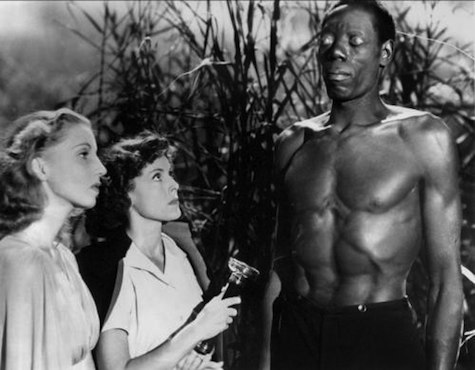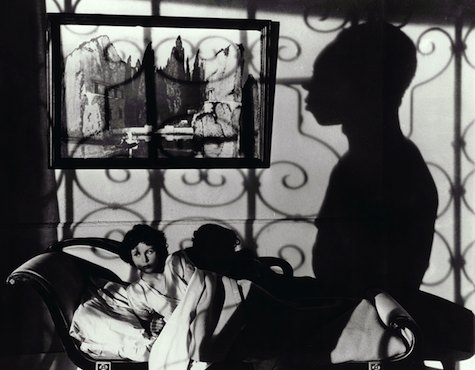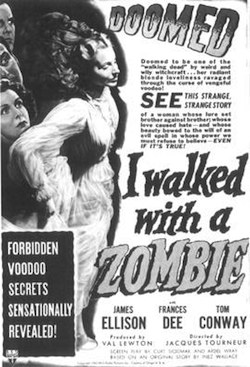For the first time, I recently watched the film I Walked With a Zombie, an oft-discussed 1943 “B-movie” directed by Jacques Tourneur and produced by Val Lewton for RKO Pictures. (If those names sound at all familiar, it’s because the cult-classic horror film Cat People came from the same creative team.) The movie stars Frances Dee, Tom Conway, and James Ellison; these three play, respectively, nurse Betsy Connell, sugar-cane plantation owner Paul Holland, and Holland’s half-brother, Wesley Rand.
Possibly what makes the film so odd is that it’s a reinterpretation of Jane Eyre, mixed with Haitian folklore and commentaries on slavery, teetering precariously between exoticism and realism. For a 1943 film, it’s less wildly offensive than I had expected it would be, though it’s hardly free of racist implications; it is trying to comment seriously on exploitation, slavery, and race, though it falls down on the job regularly and severely.
Alongside watching this movie, I’ve been reading Zora Neale Hurtson’s (also deeply problematic) Tell My Horse, a book exploring her travels in Jamaica and Haiti and her experience of voodoo traditions there. There seems to be a direct correlation between this book, which would have been contemporary to the makers of I Walked With a Zombie, and the presentations of folklore, tradition, and “zombies” in the film; the depiction of a voodoo ceremony imitates Hurtson’s descriptions near exactly, for example.
I’m still unsure of my response to both of these texts, in relation to each other and as separate pieces. On the one hand, they’re distinctly “exotic” in the way popular to narratives in the thirties and forties—exploitative, full of exaggerated “natives” and “shocking” imagery presented for a level of titillation to the generally white, Western reader—but on the other they both are making distinct attempts to engage with the racial and economic implications of their exoticized subject matter.

For example, the strongest thread in I Walked With a Zombie that I could pull out was the running reference to Saint Sebastian, suffering, slavery, and death as a form of freedom. The film is explicitly discussing the horror of slavery from the introduction of the figurehead of St. Sebastian shot with arrows, which we are told came from a slave ship and symbolizes brutality and intense suffering, to the references to crying at a birth and laughing at a funeral as a cultural tradition that comes from a life without freedom—and finally, it is flipped around to discuss the “enslavement” of the beautiful white woman, Jessica, who has been either made a zombie or is an up-and-moving catatonic. (The film plays a great deal with what is real and what isn’t, whether the magic is real or imagined.) That final switch is flinch-inducing, as it takes the suffering of the black population of the island and gives it over to a white woman—I did say it was hardly perfect—but the initial thematic arc is making a few grasps for a more sensitive commentary.
The ending—Rand’s murder-suicide with Jessica—is the culmination of the “freedom only in death” theme, and is presented as a bizarrely happy circumstance. The zombie wife is gone, Paul can marry Betsy, and the emotionally dead Rand has died with his beloved (aka, his brother’s wife). The film ends sharply there, with no dénouement, and leaves the viewer blinking and disoriented.
Overall, I walked away from the film uncertain and uncomfortable. Is it a good movie? It was certainly watchable, though predictable—but its depictions of black characters were frequently between “yikes!” and “oh my god why,” despite the film’s thematic attempt to engage with issues of race. Is it worth seeing? I suspect yes, because there are some truly amazing shots in the film, and a few moments that are genuinely intense.

But really, what I found most interesting about I Walked With a Zombie is the larger cultural shift between zombie films and mythologies that are based on the historical Haitan folklore to the contemporary flesh-eating monster-zombies. That odd evolution is just about the only thing I find interesting about the living dead anymore—they’ve been done “to death,” hah—but that tension is fascinating. Going back to a film like I Walked With a Zombie, which relies on atmospheric shots and sounds for its horror instead of the threat of a flesh-eating monster and presents zombies as ultimately pitiful creatures, arouses a bit of cognitive dissonance for a contemporary watcher.
Why has that shift happened? I’d posit that the origins of the zombie as a creature of folklore tied quite directly and immediately to issues of slavery, labor, exploitable bodies, and dehumanization is too frightening for many contemporary Western audiences and creators; it’s easier to make the zombie into a sort of ghoul, a flesh-eating monster out to destroy civilization and fulfill our apocalyptic fantasies, than to engage with a fraught and complex cultural production that forces the reader to look with a clear and unflinching eye at issues of racism, labor, and human suffering.
Certainly, I Walked With a Zombie is a very different kind of horror film than today’s offerings, and engages with a very different kind of zombie. For that, it might be worth checking out.
Lee Mandelo is a writer, critic and occasional editor whose primary fields of interest are speculative fiction and queer literature, especially when the two coincide. Also, comics. She can be found on Twitter or her website.










